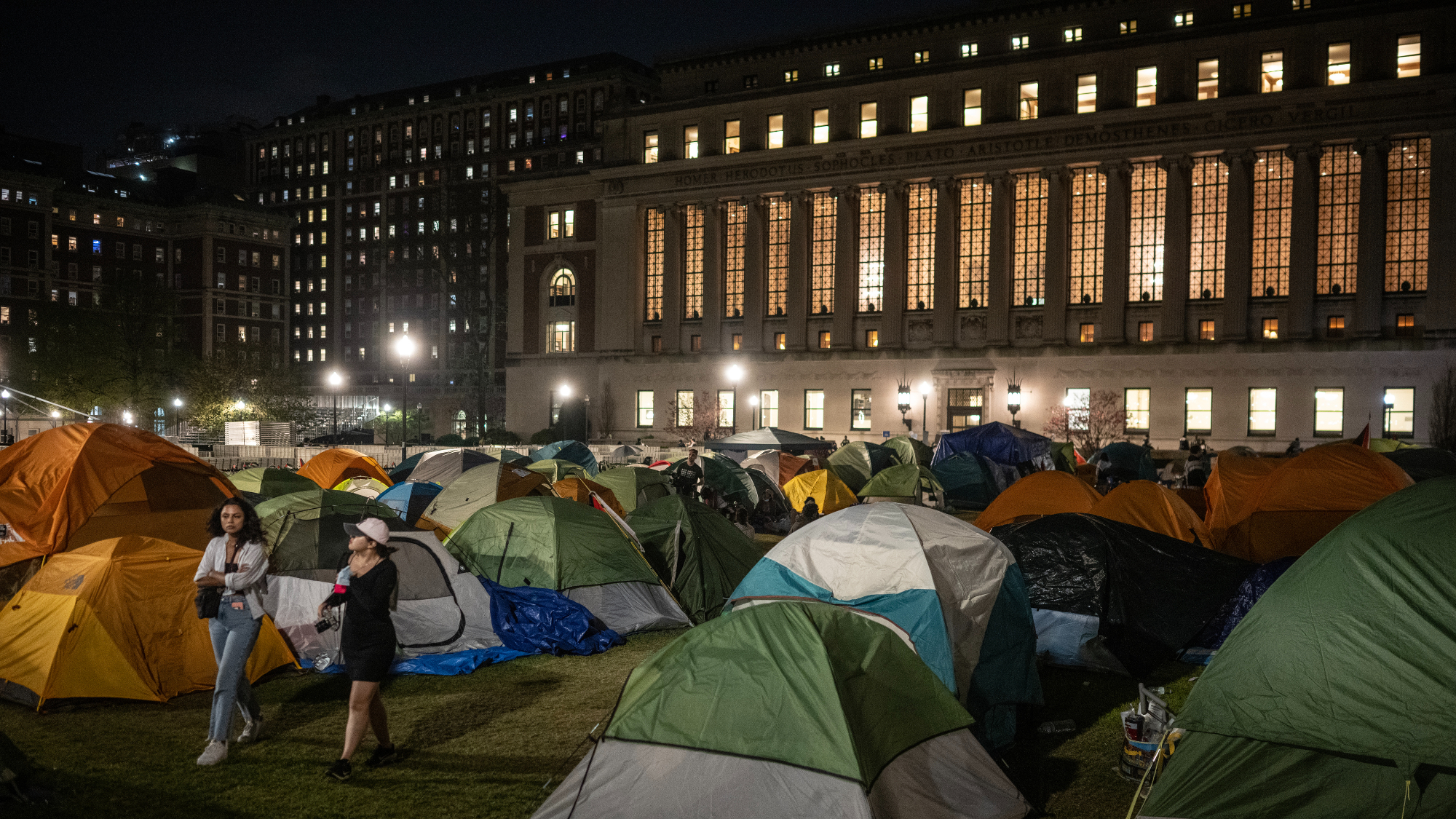Columbia begins suspending Gaza war protesters
The students are potentially barred from campus buildings and finals and ineligible to graduate in May


A free daily email with the biggest news stories of the day – and the best features from TheWeek.com
You are now subscribed
Your newsletter sign-up was successful
What happened
Columbia University said Monday it started suspending students who disregarded orders to leave a pro-Palestinian encampment, potentially barring them from campus buildings and finals and rendering them ineligible to graduate in May. Dozens of students occupied Columbia's Hamilton Hall early Tuesday. An April 18 crackdown at Columbia fueled similar entrenched protests against Israel's Gaza war, leading to about 1,000 arrests at 22 universities in 16 states, according to CNN and The Washington Post.
Who said what
With talks at an impasse, Columbia has "begun suspending students as part of this next phase of our efforts to ensure safety on our campus" and curtail the "noisy distraction" as students prepare for exams, university spokesperson Ben Chang said. Columbia's administration "didn't even offer us divestment" from Israel, said graduate student Sueda Polat, an encampment organizer. "We will not be moved unless by force."
The commentary
Columbia's academic sanctions appeared aimed at getting the encampment to "peter out" before graduation "rather than to root it out with force," inciting more protests, The New York Times said. Other elite universities have had mixed results, The Associated Press said. In one "rare case," Northwestern University on Monday reached an agreement with students to allow "peaceful demonstrations through the June 1 end of spring classes" but no tents or outsiders.
The Week
Escape your echo chamber. Get the facts behind the news, plus analysis from multiple perspectives.

Sign up for The Week's Free Newsletters
From our morning news briefing to a weekly Good News Newsletter, get the best of The Week delivered directly to your inbox.
From our morning news briefing to a weekly Good News Newsletter, get the best of The Week delivered directly to your inbox.
What next?
Columbia hopes to avoid canceling its May 15 commencement, typically held on the lawn occupied by protesters. The University of Southern California scrapped its main graduation ceremony.
A free daily email with the biggest news stories of the day – and the best features from TheWeek.com
Peter has worked as a news and culture writer and editor at The Week since the site's launch in 2008. He covers politics, world affairs, religion and cultural currents. His journalism career began as a copy editor at a financial newswire and has included editorial positions at The New York Times Magazine, Facts on File, and Oregon State University.
-
 Antonia Romeo and Whitehall’s women problem
Antonia Romeo and Whitehall’s women problemThe Explainer Before her appointment as cabinet secretary, commentators said hostile briefings and vetting concerns were evidence of ‘sexist, misogynistic culture’ in No. 10
-
 Local elections 2026: where are they and who is expected to win?
Local elections 2026: where are they and who is expected to win?The Explainer Labour is braced for heavy losses and U-turn on postponing some council elections hasn’t helped the party’s prospects
-
 6 of the world’s most accessible destinations
6 of the world’s most accessible destinationsThe Week Recommends Experience all of Berlin, Singapore and Sydney
-
 How did ‘wine moms’ become the face of anti-ICE protests?
How did ‘wine moms’ become the face of anti-ICE protests?Today’s Big Question Women lead the resistance to Trump’s deportations
-
 ‘Bad Bunny’s music feels inclusive and exclusive at the same time’
‘Bad Bunny’s music feels inclusive and exclusive at the same time’Instant Opinion Opinion, comment and editorials of the day
-
 Is the Gaza peace plan destined to fail?
Is the Gaza peace plan destined to fail?Today’s Big Question Since the ceasefire agreement in October, the situation in Gaza is still ‘precarious’, with the path to peace facing ‘many obstacles’
-
 ‘My donation felt like a rejection of the day’s politics’
‘My donation felt like a rejection of the day’s politics’Instant Opinion Opinion, comment and editorials of the day
-
 ‘No one is exempt from responsibility, and especially not elite sport circuits’
‘No one is exempt from responsibility, and especially not elite sport circuits’Instant Opinion Opinion, comment and editorials of the day
-
 ‘Human trafficking isn’t something that happens “somewhere else”’
‘Human trafficking isn’t something that happens “somewhere else”’Instant Opinion Opinion, comment and editorials of the day
-
 Is Alex Pretti shooting a turning point for Trump?
Is Alex Pretti shooting a turning point for Trump?Today’s Big Question Death of nurse at the hands of Ice officers could be ‘crucial’ moment for America
-
 Trump’s ‘Board of Peace’ comes into confounding focus
Trump’s ‘Board of Peace’ comes into confounding focusIn the Spotlight What began as a plan to redevelop the Gaza Strip is quickly emerging as a new lever of global power for a president intent on upending the standing world order
